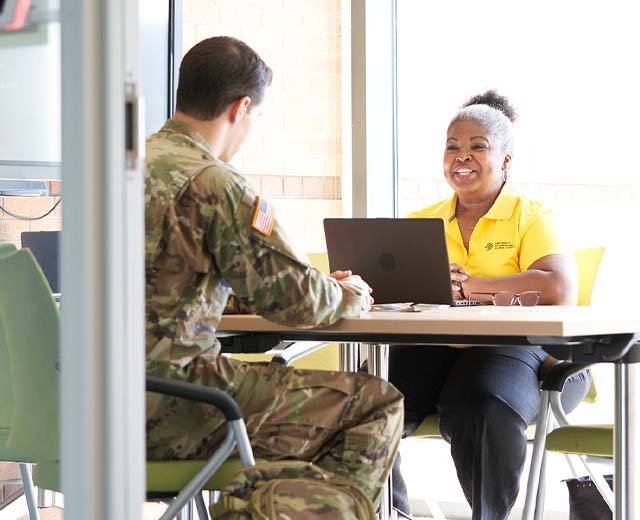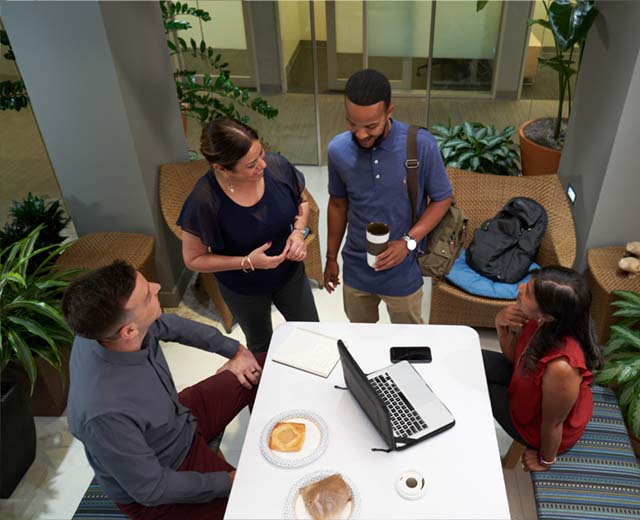This article was originally published on June 26, 2023, and was updated June 2024 and April 2025 to reflect the most recent information.
Active-duty servicemembers have many admirable traits, including dedication, reliability, and adaptability. Their adaptability becomes especially useful when they undergo a Permanent Change of Station (PCS), which is when a servicemember or unit is assigned to a new duty station. During the summer, more than 400,000 servicemembers make a PCS each year, and with the season fast approaching, many military servicemembers and their families will find out if they will be PCSing to a new location—stateside or somewhere else around the world.
A PCS move can bring many challenges as servicemembers navigate this transition. In addition to moving all their belongings, if they have families or children, they also need to coordinate travel and new arrangements in activities, jobs, or schools. Many PCS assignments give only a few months of notice, and it is a lot to organize in a very little amount of time.
Among the many things servicemembers and their families must consider when PCSing are the financial and practical factors that may affect their ability to continue their academic progress. At University of Maryland Global Campus (UMGC), we have served servicemembers for more than 75 years, and we understand the unique challenges servicemembers face as they PCS. More than 63 percent of UMGC's students are military-affiliated, and we’re here to help them make the move and keep their education on track.
What to Do When you PCS as a Student
The most important thing a student who is PCSing can do is notify UMGC about their relocation. Students can do this either online through their student portal or by speaking to an advisor or staff member.
“If a student makes a change in duty station or campus, they can log onto their student portal and update their location, and staff will receive the relocation notification,” says Pete Haugland, advisor of military portal programs at UMGC. “They will then be connected with a staff member at their new location who will have all of their information, so that they’re ready to welcome them.”
When a student notifies UMGC about their PCS, they receive a “warm handoff” where they are connected to a new advisor in their area who can provide them with the resources and support they need.
“The ‘warm handoff’ process is such an easy and great way to make sure students have consistent advisement from one duty station to another,” says Elisabeth Foster, Military Education Coordinator (MEC) at UMGC. With the “warm handoff”, MECs can set follow up tasks to check in with the new MEC and update them on a student’s situation.
If a student forgets to update their location or notify a staff member, UMGC has a system in place where students will be asked to verify their military status and location in their student portal every four months. This system allows students to maintain the support of UMGC while they organize and handle their relocation.
“UMGC is well-equipped to assist students PCSing throughout the world,” says Michelle Berck, senior certification specialist of veterans initiatives at UMGC. “Students can log into their student portal to update their location through a relocation notification, get guidance from their MEC or success coach on the process needed for transferring to a new location, and discover which courses would be best to take during this transition time.”
How to Continue Your Education During a PCS
When a student receives their PCS notice, they have a checklist of things they need to do as they prepare for their move. Understandably, managing their education may not be at the top of their priority list. While taking a break from school is not required, many UMGC staff members strongly encourage students who are PCSing to pause their education for one term so they can prioritize their mental health during a stressful time.
“I would recommend students to focus on their PCS move because while they may think they’ll have time to take classes, life gets in the way,” says Keith Hauk, vice president of stateside military operations at UMGC. “There can be a lot of unforeseen circumstances that could happen while they’re PCSing.”
Students can work with their advisors to ensure that they don’t fall behind in their education and can take a break without losing momentum. When students receive a PCS order, they will still need to finish their current term at UMGC before choosing to pause. Advisors can then help them look at the academic calendar and coordinate pausing for the term that would occur during the PCS move.
“When talking with my PCSing students, I always suggest pausing their classes until arriving at the next duty station and settling in. As a military child and spouse, I’ve witnessed all the ups, downs, and surprises associated with PCSing,” says Foster. “Uprooting a household takes months of planning and coordinating, and in the end, there are still last-minute changes and surprises. It isn’t ideal to take a break from coursework, especially when students have set goals, but taking a break allows them to focus on the move. It’s important that our students have an environment that promotes course success.”
For students who don’t want to take a break, time management is critical, as demands on the student’s time will increase and they will still be required to attend their classes and finish their coursework on time. Communication is also important.
“Depending on where they are in their program, students may be able to reduce their hours or take a lighter load for the transition term, thus avoiding any breaks in their education,” says Berck. “Remaining active can have its challenges, but with proper communication with their advisors and instructors as well as time management plans, the student can continue to advance through their program, avoiding any delay in completing their program.”
Students should also consider how to tailor their coursework during their PCS move to make it more manageable and attainable.
“When students are adamant about taking courses, I always suggest taking one course and if possible, suggest a lower-level course,” says Foster. “With a military move, multiple stress factors will pull their attention away from their coursework. My responsibility as an MEC is to look out for the best interests of my students. I also like to set up follow-up tasks to check-in twice a month with the student throughout the course. I’ve found that check-ins aid in their course success and allow me to provide not only support but additional resources.”
Justin Merchant was in the U.S. Army and attending UMGC as a student when he received his PCS notice to move from Joint Base Lewis-McChord in the United States to Vincenza, Italy. He continued his education both through his PCS and Expiration Term of Service (ETS).
“Continuing my education through my PCS and ETS was difficult at first but became easier once I reorganized my time,” says Merchant. “The professors at UMGC were extremely understanding and helped where possible, and the advisors helped me choose the classes that would be the best fit.”
Merchant agrees that both communication and time management are crucial when a student is continuing their education through a PCS. He recommends keeping an open mind and remaining flexible as unexpected circumstances may arise.
“As long as you remain on the personnel roster, you are still responsible for fulfilling your obligations to that unit. So, you might still be required to perform certain duties that reduce the amount of time you have to focus on school and PCSing,” says Merchant. “Communication with your leadership will help you balance schooling, PCSing, and any unavoidable duties. It's important to schedule a meeting with your first-line supervisor to review your priorities and potential scheduling conflicts.”
For many military students, continuing their education can be beneficial for advancing in their career both in and out of the military.
“Consider reminding your supervisor that earning college credits can help you gain promotion points; this can align your personal goals with your military career,” says Merchant. “If you're struggling to keep up with class assignments during your PCS, it's recommended to reach out to your professor and discuss the possibility of an extension.”
UMGC’s Support and Resources for PCS Students
At UMGC, we want our students to know that we are with them every step of the way. Students who are PCSing can find a variety of resources and tools at UMGC to help support their transition. UMGC offers a Green Zone training to students, which can help them learn more about how UMGC will support them during their PCS. The training takes less than 30 minutes to complete.
Students may find themselves halfway around the world from a PCS, and UMGC will be right there with them. UMGC is online and has more than 175 locations across the globe. Students can search their closest UMGC location to see what services are offered in their new area.
“Being a spouse or family of the military, we are constantly on the go,” said Chinco W., a UMGC graduate who earned a master’s in digital forensics and cyber investigation. “Having a university that can travel with you, that was a plus for me. That’s why I went with UMGC.”
UMGC has three divisions: Stateside, Europe, and Asia. When a student has a PCS from one division to another, when they notify their move in the student portal, they are assigned a new advisor in their new division. This allows students to have access to an advisor who is not only closer by, but who can share in their experience of being abroad. When a student moves from one state to another, they may receive a new advisor who is in the same state as them if they choose to meet in person. This flexibility allows students to take their education with them no matter where they go.
How UMGC Supports Military Servicemembers
UMGC has supported military students since 1947, and more than 60,000 servicemembers, veterans, and military family members are enrolled at UMGC. Military servicemembers and their families can benefit from attending an online university. At UMGC, students can take their classes at the time that best suits them and can access their coursework from anywhere in the world. We like to say that “Wherever you go, we’re there for you.”
Active-duty servicemembers have access to a reduced military tuition rate at UMGC to keep their education affordable. UMGC also offers tuition benefits for military spouses and dependents, and a variety of scholarships including the My Career Advancement Account scholarship. To fast-track their degree or certificate, military students can also transfer credit for military education and training they have previously received.
A PCS move can be a stressful and uncertain time for many servicemembers and their families. At UMGC, we are proud to support our servicemembers who do so much by providing them with an education and advisors who can understand their situation. In addition, we also provide education benefits for military spouses who want to earn their next degree or certificate. UMGC is here to help you take the guesswork out of your education during a PCS, and we will be there to support you before, during, and after your move.
Reference on this webpage to any third-party entity or product does not constitute or imply endorsement by UMGC nor does it constitute or imply endorsement of UMGC by the third party.

/blog-inline-military-experience-academic-credit_ph-53martin210621umgc33654_retouched.jpg)



Share This